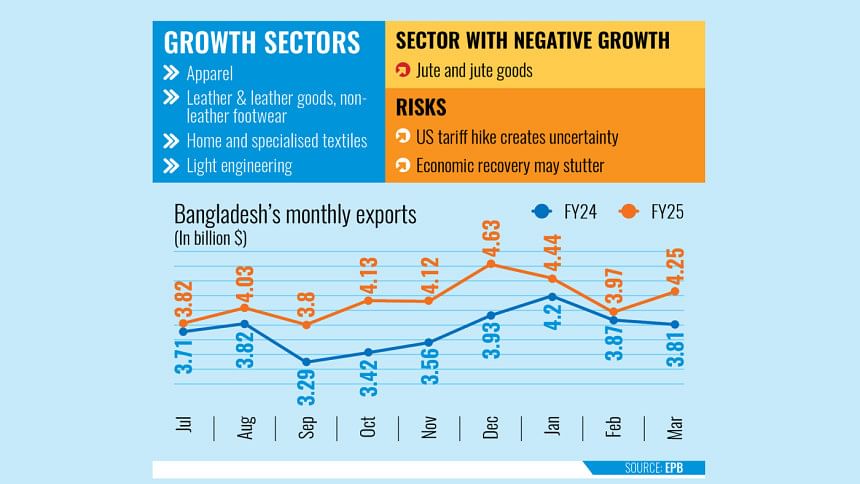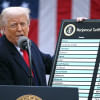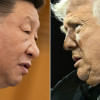Exports rise but Trump tariffs create uncertainty

After two months of sluggish growth, Bangladesh's exports surged in March, driven by strong growth in the readymade garment (RMG) sector.
Exports grew 11.44 percent year-on-year to $4.25 billion last month, with RMG manufacturers fetching 81 percent of total receipts.
This drew mixed reactions from analysts, especially in light of the tariff hike by the US administration.
After the imposition of new tariffs by the US, the export outlook has become uncertain, said MA Razzaque, chairman of Research and Policy Integration for Development.
As such, if exports cannot pick up further, economic recovery could stutter, he opined.
"This will have spillover effects on other markets as exporters aim to oversupply to those markets, depressing prices. Trump's policies can also trigger a global recession, dampening growth prospects here in Bangladesh and elsewhere," he added.
"More importantly, if Trump is going to offer generous concessions to others, such as Vietnam, India and Cambodia, through bilateral negotiations and not to Bangladesh, that can be disastrous. Overall, the global economy and trading environment have now become uncertain and unpredictable, which is not conducive to achieving economic stability."
Razzaque added that the return to double-digit growth is commendable, but it has been achieved based on last year's weak base.
"On the structure of exports, it is more or less the same story," he said. "After a prolonged weakness in the global demand for apparel, we started seeing a bounce back."
Including March's shipment, total exports in the first nine months of the current fiscal year climbed to $37.19 billion, reflecting a 10.63 percent year-on-year spike.
The rise in exports, coupled with migrant workers sending home a record $3.29 billion in remittances in March, has provided a welcome boost to the country's dwindling foreign exchange reserves.
"Bangladesh's export sector has demonstrated a commendable performance," the Export Promotion Bureau said in a statement.
During the first three quarters of FY25, RMG exports amounted to $30.25 billion, marking a 10.84 percent year-on-year increase.
Kazi Iqbal, a research director at the Bangladesh Institute of Development Studies, said the upward trend indicates that the country's manufacturing sector has become increasingly resilient to shocks.
"We have mastered this art quite efficiently over time."
Apart from apparel, exports of leather and leather goods, the second-biggest export earner, recorded 22.64 percent growth in March. In the July–March period, exports of leather and leather goods increased by nearly 10 percent year-on-year to $852 million.
Light engineering products, home and specialised textiles, and non-leather footwear exporters also witnessed higher shipments during the period.
However, despite a slight pickup in the jute sector's exports in March, overall shipment during the July–March period of FY25 fell.
The EPB added that agricultural products, an emerging export segment, suffered significant negative growth year-on-year, dropping 25.72 percent in March, necessitating targeted interventions to reverse the trend.
"We have to be very vigilant following tariff hikes by the Trump administration," Iqbal added.
"In fact, we need to collect daily data on the experiences of the exporters — to what extent the shipments are being cancelled, deferred, or subject to any negative impacts. Any knee-jerk reaction may be counterproductive in the long run."
"It's time to carefully observe reactions from other countries, particularly our competitors."
Iqbal also underlined Bangladesh's bargaining power when it comes to the RMG sector.
"Our competitors don't have the capacity to bid away a large portion of our orders. Buyers didn't leave us after the Rana Plaza accident, and they will not do so this time around either," he said.
"But we have to be wary of potential stagflation in the US. If it happens, this will certainly have a negative impact on our RMG exports. Let's see what the future holds for us."
Iqbal said tariff hikes by the US administration had intensified the uncertainty currently being experienced by the economy.
"Obviously, it will slow down our economic recovery."

 For all latest news, follow The Daily Star's Google News channel.
For all latest news, follow The Daily Star's Google News channel. 








Comments